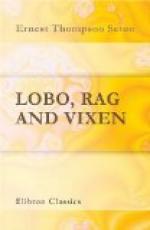Cuddy lived in a wretched shanty near the Don, north of Toronto. His was what Greek philosophy would have demonstrated to be an ideal existence. He had no wealth, no taxes, no social pretensions, and no property to speak of. His life was made up of a very little work and a great deal of play, with as much out-door life as he chose. He considered himself a true sportsman because he was ‘fond o’ huntin’,’ and ‘took a sight o’ comfort out of seein’ the critters hit the mud’ when his gun was fired. The neighbors called him a squatter, and looked on him merely as an anchored tramp. He shot and trapped the year round, and varied his game somewhat with the season perforce, but had been heard to remark he could tell the month by the ‘taste o’ the patridges,’ if he didn’t happen to know by the almanac. This, no doubt, showed keen observation, but was also unfortunate proof of something not so creditable. The lawful season for murdering partridges began September 15th, but there was nothing surprising in Cuddy’s being out a fortnight ahead of time. Yet he managed to escape punishment year after year, and even contrived to pose in a newspaper interview as an interesting character.
He rarely shot on the wing, preferring to pot his birds, which was not easy to do when the leaves were on, and accounted for the brood in the third ravine going so long unharmed; but the near prospect of other gunners finding them now, had stirred him to go after ‘a mess of birds.’ He had heard no roar of wings when the mother-bird led off her four survivors, so pocketed the two he had killed and returned to the shanty.
The little grouse thus learned that a dog is not a fox, and must be differently played; and an old lesson was yet more deeply graven—’Obedience is long life.’
The rest of September was passed in keeping quietly out of the way of gunners as well as some old enemies. They still roosted on the long, thin branches of the hardwood trees among the thickest leaves, which protected them from foes in the air; the height saved them from foes on the ground, and left them nothing to fear but coons, whose slow, heavy tread on the limber boughs never failed to give them timely warning. But the leaves were falling now—every month its foes and its food. This was nut time, and it was owl time, too. Barred owls coming down from the north doubled or trebled the owl population. The nights were getting frosty and the coons less dangerous, so the mother changed the place of roosting to the thickest foliage of a hemlock-tree.
Only one of the brood disregarded the warning ’Kreet, kreet.’ He stuck to his swinging elm-bough, now nearly naked, and a great yellow-eyed owl bore him off before morning.
Mother and three young ones now were left, but they were as big as she was; indeed one, the eldest, he of the chip, was bigger. Their ruffs had begun to show. Just the tips, to tell what they would be like when grown, and not a little proud they were of them.




